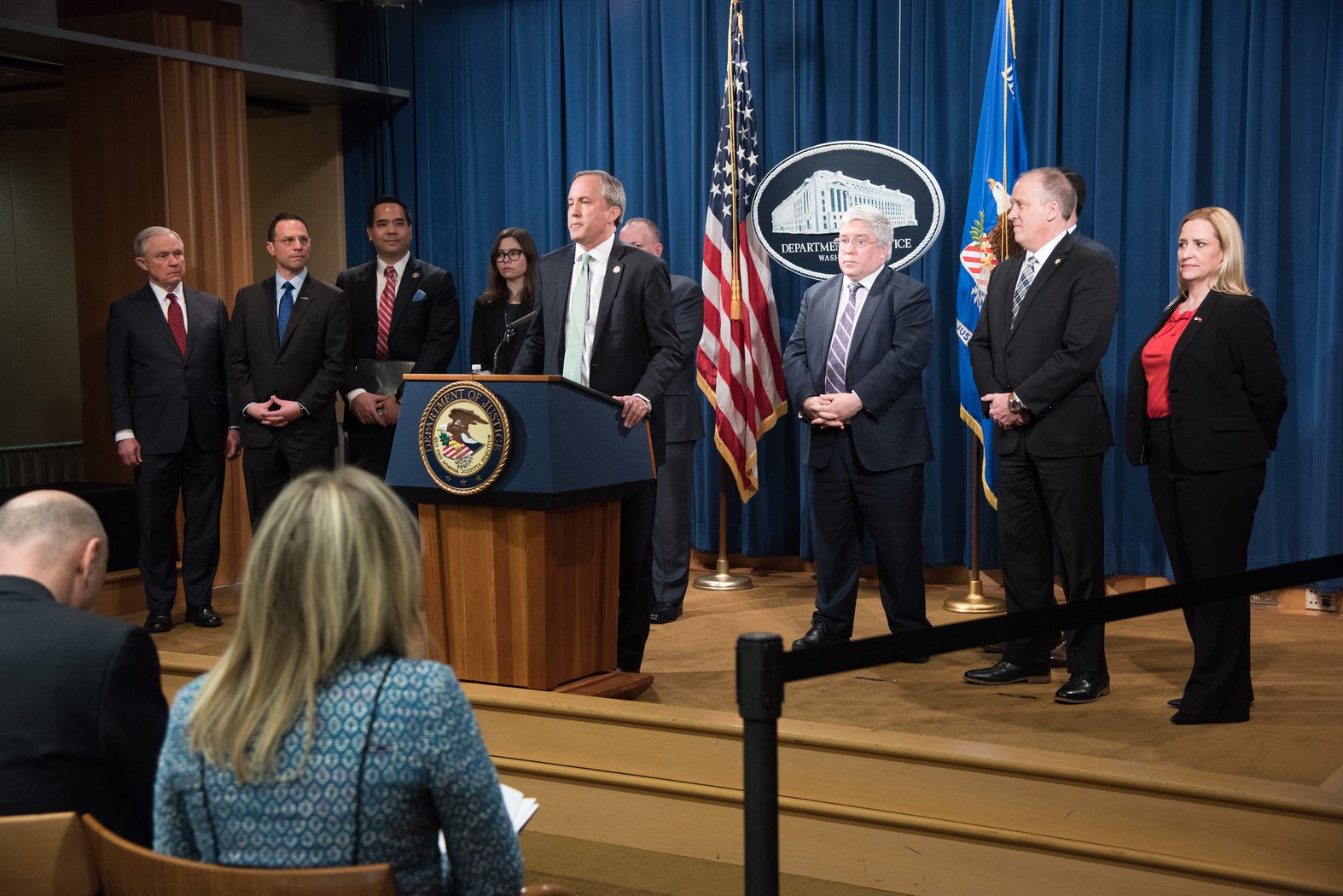
Photo caption: Ken Paxton delivering remarks in 2018. Photo courtesy U.S. Department of Justice.
You may have noticed a recurring line in news stories over the past decade: 12 Republican attorney general file suit, or 19 Republican attorneys general call on so-and-so to rethink their policy on diversity or guns or birth control, or 14 Republican attorneys general sign onto an amicus brief in x or y constitutional challenge. In the vast majority of cases, any hint of coordination amongst these AGs ends there. It shouldn’t, because it doesn’t. Republican attorneys general don’t just wind up joining suits and letters and briefs en masse because they have a group chat. These efforts are coordinated by a central body, the Republican Attorneys General Association, or RAGA. Regular listeners or readers of Drilled will be all too familiar with this name, we’ve covered them multiple times over the years, but after reading the thousandth story today about 19 Republican AGs signing onto something (this time trying to pressure CostCo to drop its DEI policies), I realized we should probably pull it all together in one spot for easy reference. So herewith: a primer on RAGA.
But first, credit where it’s due: I first came across RAGA while working on a season of the podcast This Land, about the various lawsuits taking aim at the Indian Child Welfare Act, and specifically while talking to former Senate investigator and longtime oppo researcher Lisa Graves, of True North Research, who is probably the reason anyone knows about RAGA (or Leonard Leo and the Federalist Society, or the Koch universe; honestly Lisa’s research is at the root of so many groundbreaking stories over the past decade or more). That conversation with Lisa sparked an ongoing obsession and I’ve since learned everything I can about this organization and how strategically important it is to many of the big political changes we’ve seen over the past 20 years.
RAGA was organized back in the late 1990s by Republicans as a response to widespread tobacco litigation, which had been spearheaded by Democratic attorneys general. Republicans looked at that and realized (a) it was a good idea, and it had worked, (b) Democrats outnumbered Republicans in attorneys general offices, and (c) if they were going to protect other industries from legal action (like, oh I don’t know, the fossil fuel industry), they needed to tip that balance and start strategizing their own multi-state cases.
The attorneys general of Alabama (William Pryor), Texas (John Cornyn), and South Carolina (Charlie Condon) came together to start RAGA, and then set about fundraising and strategizing to get more Republican attorneys general elected. That was step one: get more Republican AGs elected. So at that point, RAGA was no different than any other party-aligned group. Within a decade, they had tipped the scales in favor of Republicans. But since about 2013 RAGA has shifted into a new phase, taking major donations from corporations and dark-money groups and then strategically signing onto suits that help those individuals or industries. Thanks to Citizens United, the 2010 Supreme Court case that gave corporations the right to donate anonymously to political campaigns, RAGA was able to create a Political Action Committee to funnel dark money from industry groups and corporations straight to the attorneys general that are supposed to regulate those industries, but are now working on their behalf instead.
“Since 2013 we've seen their funding build and the Judicial Confirmation Network and the Concord Fund are by far the biggest funders of RAGA,” Graves explained to me. “Their funding dwarfs what RAGA gets from the U.S. Chamber of Commerce or Koch Industries.”
That’s important because JCN and Concord are the funding vehicles controlled by former Federalist Society president Leonard Leo, the guy who’s been picking judicial nominees for the Republican party for the past decade or so, and in more recent years has been masterminding the legal attack on abortion, LGBTQ rights, climate policy and more.
“In 2015 I started a project where we were doing FOIAs [Freedom of Information Act requests] of these AGs all over the countries, and we ended up getting RAGA's fundraising chart, which showed here's what you get for this amount and that amount. But Leo is giving them way more than the top level. You can see what Koch is buying but not what Leo's buying because it's so huge. Then Ken Paxton came in as AG elect in Texas, and one of his advisors was Leonard Leo.”
I asked Graves if Democrats had a similar operation going. But while DAGA exists, it has one fatal weakness when going up against RAGA: “They're at a huge competitive disadvantage because they're not raising money from the corporations that they're regulating,” Graves said.
"We know that it's a pay-to-play operation," Graves said of RAGA."It's had an enormously distorting effect on U.S. law. It provides a mechanism for corporations to pass money through to help attorneys general in ways that they would not be able to individually solicit for their own campaigns, given their regulatory role over those very industries."
So how does it work? Well the case that opened my eyes to RAGA is a good example: Brackeen v Haaland. It went all the way to the Supreme Court in 2023, but it started in Texas, with Paxton. The case challenged the constitutionality of the Indian Child Welfare Act (ICWA), claiming that it was race-based and therefore violated the equal protection clause of the 14th amendment. It was filed on behalf of a white couple in Forth Worth who felt they’d had to jump through too many hoops to adopt a native child. Ultimately, Paxton couldn’t get many other AGs to sign on and the suit failed, but it’s not the last we’ll see of a RAGA-backed attack on ICWA.
Graves said the Brackeen case is a perfect example of the sort of suit that has been made possible by the rise of RAGA. "Texas has hardly any tribal lands," she said. "So you have this attorney general in a state that is particularly friendly and warm to Koch, to the other oil and refinery companies, and to Leonard Leo. And it has very, very few tribal holdings in the state, but yet it's getting involved here."
The same day the Brackeen case was filed, David Hacker, an attorney in Paxton's office who has since left to work for First Liberty Institute, the legal nonprofit spearheading attacks on LGBTQ rights, wrote an email to the RAGA member list with the subject line "New Federalism Case Opportunity."
"Friends, today, Texas filed a new complaint against the federal government concerning application of the Indian Child Welfare Act," he wrote. "I write to ask if any of you want to join this effort as co-plaintiffs. … ICWA creates foster-care and adoption preferences that require state courts to choose Indian families over non-Indian families when determining placement of an Indian child. These preferences set aside state law that would look to the best interest of the child in favor of racial discrimination that violates the Fourteenth Amendment."
Compared to Paxton's anti-abortion, anti-immigration, and anti-climate policy cases, which typically entice a dozen or so co-plaintiffs, Hacker's efforts were relatively unsuccessful. Indiana and Louisiana signed on as co-plaintiffs, and Ohio wrote an amicus brief. Indiana and Louisiana eventually dropped out of the case. Despite that, the Brackeen case shows how well the Republican judicial machine works in Texas, and how critical the AG's office is to making it all work, not just in Texas but on a national level. "What you have now with the judicial selection committee in Texas [headed by Cornyn and Ted Cruz] and the very strategic composition of the 5th Circuit, and then the Supreme Court now too, is an extreme form of forum shopping, where all you need is someone willing to file the initial complaint," Graves said. "The Texas AG's office really sets the docket for the 5th Circuit. It's a really important role."
A Biden administration climate case is another example.
Back in 2016, climate policy researcher Peter Erickson published a paper that looked at how expanding oil production in the U.S. increased oil consumption worldwide. I’ve said it before and I’ll say it again: despite all of its claims to the contrary, the fossil fuel industry does not just supply a demand. It manufactures demand.
Erickson used the Department of Interior’s own math, which has historically been quite friendly to the fossil fuel industry, to determine that if the U.S. were to expand oil production by X barrels, global oil consumption would increase by about 0.5X barrels, because the fossil fuel industry somehow always finds a way to spur demand. He shared his findings with the Department of the Interior, and in 2022 a D.C. federal court judge used those findings as part of his justification for canceling oil and gas leases of more than 80 million acres in the Gulf of Mexico.
You might recall that Biden canceled those leases himself in 2021 via executive order. But almost immediately a RAGA-coordinated group of 13 Republican attorneys general, led by Louisiana Attorney General Jeff Landry, sued and a federal judge in Louisiana blocked that order mandating that the Biden administration hold the lease sales that had already been scheduled.
Environmental groups sued to block them again, saying the Department of Interior had used outdated environmental information to authorize those leases in the first place, and had thus violated the National Environmental Protect Act (NEPA). That’s what federal judge Rudolph Contreras affirmed in his 2022 decision, making the very obvious, but somehow also groundbreaking, conclusion that If you expand oil production, you also expand oil consumption and, therefore, greenhouse gas emissions. What’s really huge about that decision was that it actually took into account the fact that U.S. oil companies supply the rest of the world too.
This case is a perfect example of how and why the courts are so critical when it comes to climate accountability. It’s easy to see RAGA’s fingerprints all over this, but equally, it’s yet another example of them not always winning. The West Virginia v. EPA case, on the other hand, was an example of RAGA working perfectly as designed. To start, the case should never have been heard. It was accepted when Obama’s Clean Power Plan was a thing. By the time it was heard, that policy was dead in the water. So why hear a case about a policy that doesn’t even exist? To preemptively block similar policies from ever being passed.
It was unprecedented for the Supreme Court to step in on such a matter, and it effectively kept the federal agency tasked with environmental protection from following science. That fact was further underscored in Justice Kagan’s dissent, which took the case out of the weeds of the particular Clean Air Act section in question and placed it back into reality: the science is unambiguous on climate, and the impacts will be unprecedented, surely now is not the time to quibble about whether “clean air” explicitly means maintaining a livable atmosphere?
It’s also important to note that West Virginia v EPA didn’t come from some poor, cash-strapped coal producer who was worried about how the Clean Power Plan would affect their business. It was a case crafted very strategically by RAGA. At the time that the case was filed, Scott Pruitt was Attorney General of Oklahoma and led RAGA. He met with failing coal producers in early 2015, then helped coordinate and file the case in November 2015, right around the time those very same coal producers made large contributions to the RAGA coffers. Then, as Trump’s EPA head, Pruitt drafted a proposal in early 2017 to repeal the Clean Power Plan. In that proposal, he introduced the idea that the Clean Power Plan represented a “major question” that ought to be answered by Congress or the courts, not a regulatory agency. It’s the very same argument Chief Justice Roberts repeated in his defense of the court taking up the case.
So, there you have it, RAGA is a pay-for-play operation that enables industries, companies and wealthy individuals who want to shape the regulatory landscape to fund attorneys general in a way they would not be legally allowed to do directly. Those attorneys general then work together to file strategic constitutional challenges or sometimes, as in the CostCo case, just to intimidate people who aren’t playing ball. When you see a story that mentions more than two Republican AGs teaming up on something, it’s almost certainly a RAGA effort, which means you have to question whose interests it’s serving, those of the citizens an attorney general is supposed to protect or those of the wealthy donors RAGA has sworn to serve?
The largest of those donors, Leonard Leo, has been quite clear about what he’s trying to do. In a speech to the Council on National Policy a few years back he said that America stands at the precipice of what he called “the revival of the structural constitution.”
“He told the audience that no one alive in that room had seen the type of legal revolution that America was about to see based on the appointments to the Supreme Court and other courts to revive this so-called structural constitution to the law as it existed pre-New Deal,” Graves said. “And that affects a whole host of laws: civil rights laws, labor laws and labor rights, environmental regulation and more. It's an attempt, in my view, to really limit the ability of Congress to pass laws, to limit the ability of agencies, to regulate corporations and and to sort of change the whole modern structure of government. It’s an extreme, radical, reactionary agenda, to change our rights and and limit our powers in our democracy through our representatives in ways that serve a very elite agenda.”
That’s what we’re dealing with and it would be helpful if journalists made that clear.


